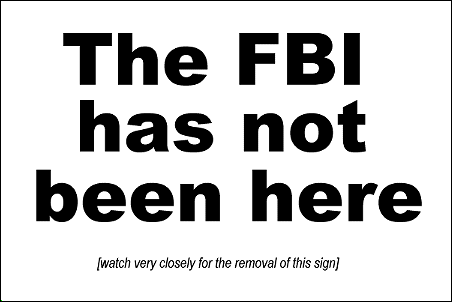
Hello, I was away for the summer. It seems that there has been some activity. If you’re here because you heard about my The FBI Has Not Been Here signs, here is a link to the page where I first mentioned them, back in 2005 or so [ETA: Internet Archive says 2002, thanks Frank]. Back when this idea was getting batted around it was originally because the USA PATRIOT Act was concerning people, the idea that if you even got a National Security Letter not only would it compel you to turn over records, but it also prevented you from telling anyone other than your legal counsel. This sort of sucked and so people fought back. Most notably the people from Library Connection in Connecticut who got the gag order part of the USA PATRIOT Act declared unconstitutional. And you may have read about Brewster Kahle talking in the New Yorker about what it’s like to get a National Security Letter. Brewster is one of the strongest advocate for the right to privacy (and libraries’ right to defend their patrons’ privacy) and even he was sort of freaked out by this. Now that we’re looking into the face of the NSA looking into damned near everything and their heavy-handed tactics to get corporations to comply with them, it’s almost quaint thinking that we were just afraid of the USA PATRIOT Act. You can read more about the idea of “warrant canaries” here. I certainly didn’t think them up, just got a little traction with this one. Oh hey look there is this image over on Wikipedia’s warrant canary article. That’s nice.
5 thoughts on “The FBI, and whether they’ve been here or not”
Comments are closed.
i just read yesterday about cory’s idea for a web-based version of this sign: http://www.theguardian.com/technology/2013/sep/09/nsa-sabotage-dead-mans-switch
I think these canary signs lull people into a false sense of security. As more and more library functions get interconnected, individual libraries might not even be aware of government snooping.
For example, my library is part of a county-wide consortium which provides services, including ILS, ILL and email to its member libraries. We could have a canary sign up in our library, but be unaware that the government has served our consortium with a letter or subpoena. But we can go further. My consortium has outsourced ILS management to the ILS vendor. That means, I think, that the government can serve the vendor with a letter and the consortium will be unaware… I think.
Additionally, the system has outsourced email to Google, even though the domain name on the email addresses give no hint of that. Google can be served and, once again, no one on this end will know. All of our email correspondence is conducted through Google.
We have noted these issues in our privacy policies, but I don’t think there is more we can do.
If we did absolutely everything in-house, including electronic content such as databases, ebooks, etc. then such a sign would have validity. The reality is, however, that libraries have lost control of their patron’s privacy. Canary signs, while amusing, are a false promise, because we have no way of knowing if the FBI has visited or not.
Not disagreeing. These are an amusuing idea at the time (2003) to highlight a thing about privacy and the extent to which we weren’t even allowed to talk about things that might affect patron privacy. I think opening up a conversation about these issues is really important, but realistically this isn’t going to have the effect that we wish it would.